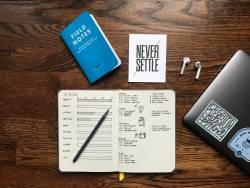
How to Stop Assuming: 10 Expert-Backed Ways

Have you ever hurt yourself or your loved ones by making assumptions? Stop assuming can help you improve important areas of your life.
Your work. Your relationships. Your happiness.
“It ain’t what you don’t know that gets you into trouble. It’s what you know for sure that just ain’t so.” – Mark Twain
The useful tips you are about to see are collected from experts and best-selling books, such as The 7 Habits of Highly Effective People by Stephen Covey and The Four Agreements by Don Miguel Ruiz.
And now it’s time to share the impactful ideas.
1. Ask yourself “Are you sure?” often
“When we are too sure, we suffer. When we ask ourselves, ‘Are you sure?’ we have a chance to look again and see if our perception is correct or not.” - Thich Nhat Hanh, How to See
“When we are too sure, we suffer. When we ask ourselves, ‘Are you sure?’ we have a chance to look again and see if our perception is correct or not.” - Thich Nhat Hanh, How to See
When you think something or someone is bad, ask yourself, “Are you sure?”. Are you sure that that person is intentionally doing something bad? Are you sure that you have never done something similar?
2. Remind yourself that there’s no absolute good or bad
“It is not possible to judge any event as simply fortunate or unfortunate, good or bad. …… You must travel throughout all of time and space to know the true impact of any event. …… Fortunate and unfortunate, good and bad, these concepts exist only in our perceptions.” - Thich Nhat Hanh, How to See
“It is not possible to judge any event as simply fortunate or unfortunate, good or bad. …… You must travel throughout all of time and space to know the true impact of any event. …… Fortunate and unfortunate, good and bad, these concepts exist only in our perceptions.” - Thich Nhat Hanh, How to See
Look deeply in any action, any product, any system, and you would be able to see both the good and the bad. When someone does something you don’t agree with, don’t assume that this is all bad. Find the good in it.
3. Ask more questions
“Don't Make Assumptions. Find the courage to ask questions and to express what you really want. Communicate with others as clearly as you can to avoid misunderstandings, sadness and drama. With just this one agreement, you can completely transform your life.” - Don Miguel Ruiz, The Four Agreements
“Don't Make Assumptions. Find the courage to ask questions and to express what you really want. Communicate with others as clearly as you can to avoid misunderstandings, sadness and drama. With just this one agreement, you can completely transform your life.” - Don Miguel Ruiz, The Four Agreements
In his book The Four Agreements, Don Miguel Ruiz considered "don't make assumptions" as one of the four most important rules for life. Actively get rid of areas that you are not sure about by asking questions. Then you can get rid of areas that you need to make assumptions about.
4. Express your thoughts clearly
The second half of the solution that Ruiz provided in his book is: express your thoughts clearly. By doing so, the person that you are talking to would have a much better understanding of what you want to say, and therefore, make less assumptions.
5. Keep a journal
“Keeping a journal remains one of the most effective ways for mindfulness. …… Your thoughts and feelings become clearer in writing than in your mind.” - Ryan Holiday, (article) 9 Stoic Practices That Will Help You Thrive In The Madness Of Modernity
“Keeping a journal remains one of the most effective ways for mindfulness. …… Your thoughts and feelings become clearer in writing than in your mind.” - Ryan Holiday, (article) 9 Stoic Practices That Will Help You Thrive In The Madness Of Modernity
The first step to avoid making assumptions is to be aware that you are assuming. Writing down your thoughts is an excellent way to examine your thoughts and give yourself a chance to see if there are assumptions within them.
6. Listen deeply before you talk
“Most people do not listen with the intent to understand; they listen with the intent to reply.” - Stephen R. Covey, The 7 Habits of Highly Effective People
“Most people do not listen with the intent to understand; they listen with the intent to reply.” - Stephen R. Covey, The 7 Habits of Highly Effective People
In his book The 7 Habits of Highly Effective People, Stephen Covey defined “Seek first to understand, then to be understood” as one of the seven habits. Oftentimes, it is very tempting to respond before someone finishes a sentence. How much of that is about trying to make people think that you are smart? Learn to be a good listener.
7. Know that there are more than two views to an issue
“If you find yourself saying ____ is always good or ____ is never bad, you may be a member of an idea cult. Appreciating complexity reminds us that no behavior is always effective and that all cures have unintended consequences.” - Adam Grant, Think Again
“If you find yourself saying ____ is always good or ____ is never bad, you may be a member of an idea cult. Appreciating complexity reminds us that no behavior is always effective and that all cures have unintended consequences.” - Adam Grant, Think Again
If you see an article that tells you that there are only two groups of people: apple lovers and orange lovers, would you believe it? Banana lovers are the first ones to say no. Why would anyone think otherwise for complex issues?
8. Know that everyone is biased, including you
“Beware the ‘I’m-not-biased’ bias: recognizing the flaws in other people’s thinking, but assuming you’re immune. The less biased you think you are, the less likely you are to catch yourself.” - Adam Grant, Think Again
“Beware the ‘I’m-not-biased’ bias: recognizing the flaws in other people’s thinking, but assuming you’re immune. The less biased you think you are, the less likely you are to catch yourself.” - Adam Grant, Think Again
Being good at arguing doesn’t mean being right. With wrong assumptions, the best debater can argue flawlessly and logically but come to the wrong conclusion. Accept the fact that you are biased and you do make assumptions, all you can do is to catch those moments when you make assumptions as best as you can.
9. Detach the message from the messenger
“The association really works ... at a subconscious level, which makes it very insidious. The Persians really did kill the messenger that brought the bad news. Do you think that is dead?” - Charlie Munger
“The association really works ... at a subconscious level, which makes it very insidious. The Persians really did kill the messenger that brought the bad news. Do you think that is dead?” - Charlie Munger
Have you ever assumed someone did something wrong, because you thought that person was bad? Stop doing this or you might be missing some very important messages.
10. Develop mindfulness by taking long walks or meditating
“When you walk, arrive with every step. That is walking meditation. There’s nothing else to it.” - Thich Nhat Hanh, How to Walk
“When you walk, arrive with every step. That is walking meditation. There’s nothing else to it.” - Thich Nhat Hanh, How to Walk
To catch yourself making assumptions, you have to develop your ability to observe the thoughts. Meditating is an effective way to develop mindfulness. Taking long walks is another great way. You can even combine the two by doing walking meditation.
Final Thoughts
These are tools from the best minds. Knowing them helps, but it’s not enough. Choose the ones that suit you and practice them.
Are you ready to become a better version of yourself?













